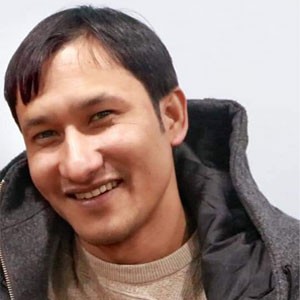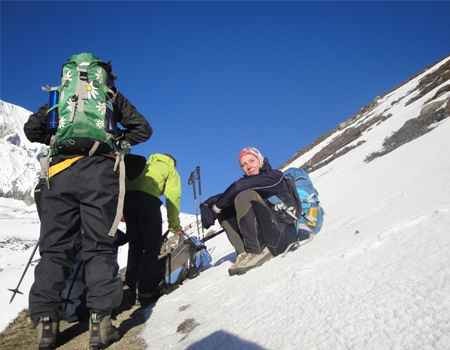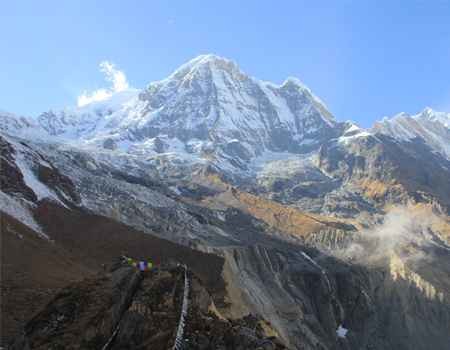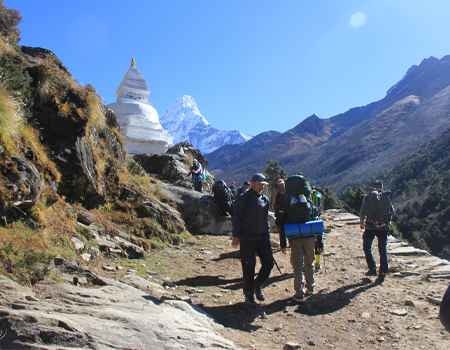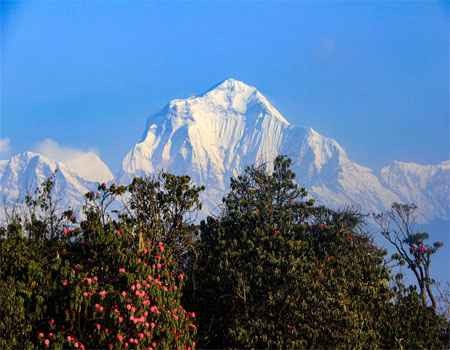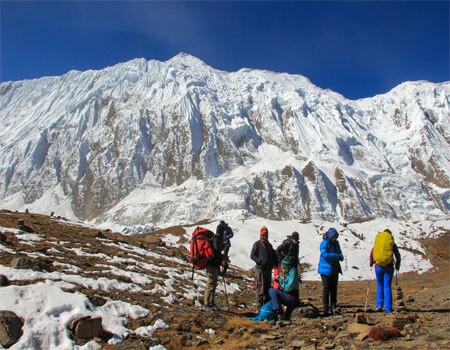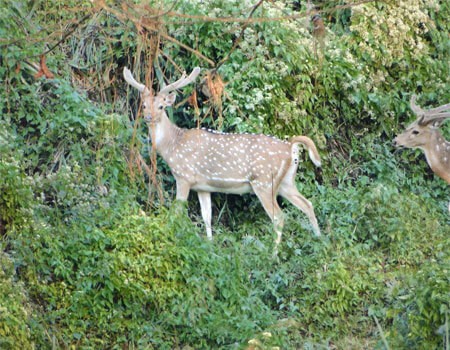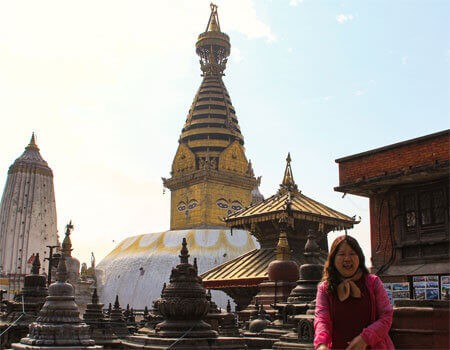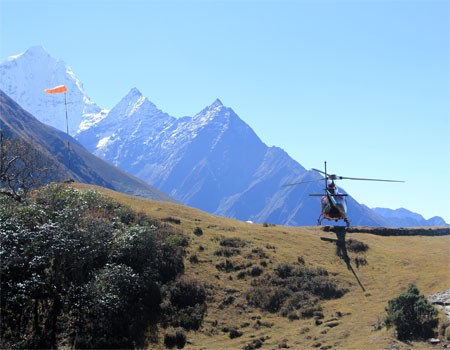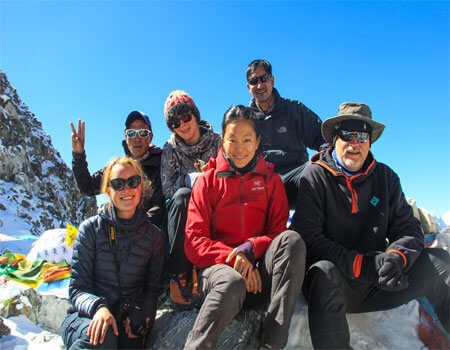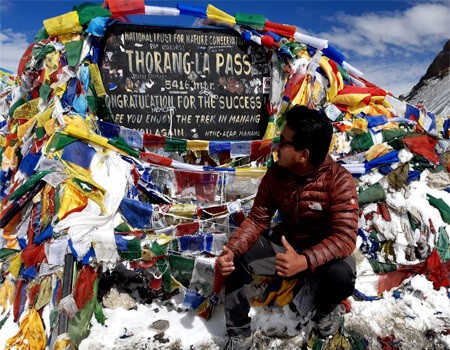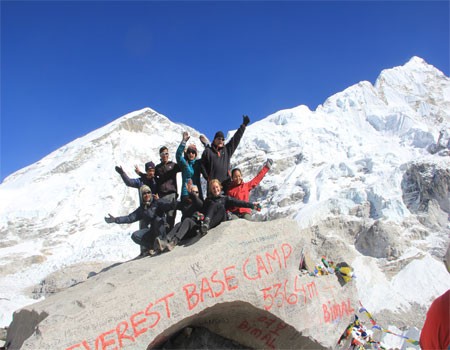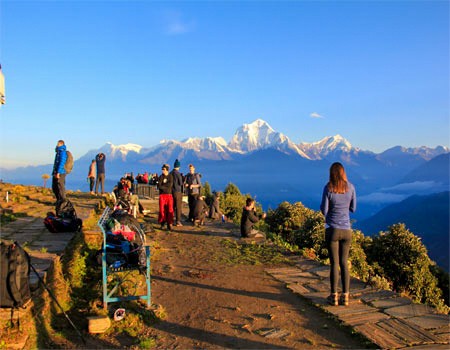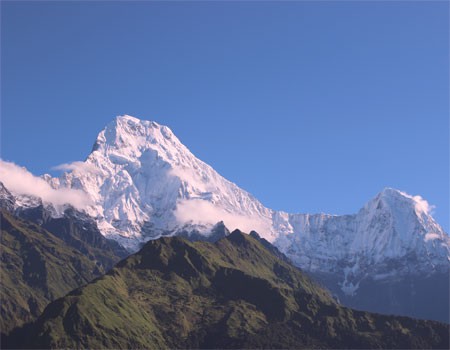There are some useful Nepali Phrases that you must learn before traveling to Nepal. We will provide information and meaning about those phrases in this Nepal Travel Blog. It is not just to captivate the locals; it is also fun to travel if you speak some Nepalese words during your Nepal stay. Several sites and online access allow you to learn essential Nepali Phrases. Also, this post can be beneficial to you to learn about some helpful Nepalese phrase, their meaning, and pronunciation. For instance, Namaste is a universal greeting, Dhanyawad is used when thanking someone, Maph Garnus is for apologizing or seeking forgiveness, and Kripaya is used when making a polite request.
Namaste – Greetings/Respect
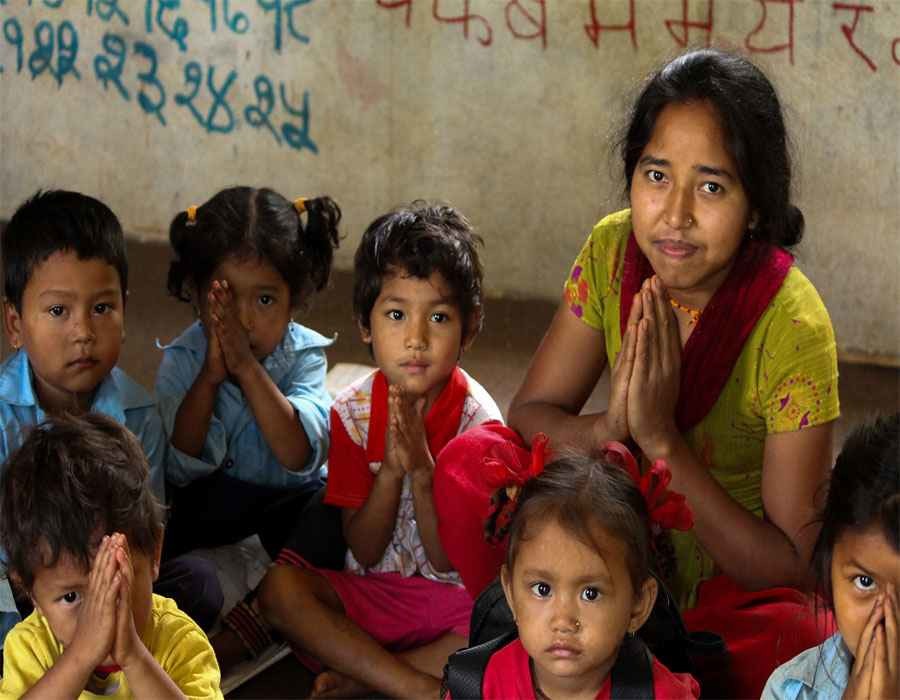 Way of Namaste in Nepal
Way of Namaste in Nepal
Namaste is a Nepali phrase that expresses respect. But it is a standard greeting nowadays. How do you pronounce Namaste? The proper pronunciation of Namaste is Na-Ma-Stay in British and Naa-Muh-Stay in American tone. You can join both palms of your hands to say Namaste.
One of the most universal Nepali phrases is Namaste. You can use this respectful greeting with any Nepali you meet during your travels in Nepal. While Nepal boasts 123 local ethnic languages, Namaste is a unifying greeting that transcends these differences. It's a sign of respect you can use with any ethnic group, especially if you're unfamiliar with the regional greetings.
Dhanyawad/Dhanyabad – Thank You
Dhanyawad or Dhanyabad is one of the essential Nepali Phrases you must learn before traveling to Nepal. When you thank people, you can say Dhanyawad/Dhanyabad in Nepal. It pronounces Dhan-Ya-Baad. You can say Dhanyabad by joining your palms like Namaste.
Maph Garnus – Excuse Me/ Sorry
Maph Garnus is a vital phrase you must learn before traveling to Nepal. Whenever you do not understand what someone says or make any mistakes, you can say Maph Garnus in Nepal. The Pronunciation of Maph Garnus is Maaf-Gar-Nuhs.
Kripaya – Please
Another essential phrase to learn before you land in Nepal is Kripaya. The correct pronunciation of Kripaya is Kri-Pa-Yaa, which can be beneficial for ordering food and other things in Nepal.
'Ramro' – Good
You can use the phrase Ramro for different proposes in Nepal. When you see a magnificent view, nature, scenery, or other things, you can say Ramro. You can add Dherai before saying Ramro to say perfect, handsome, and other good-looking things. However, saying Ramri for females rather than saying Ramro would be best. You can also use the word Ramro to agree if you like something the other person says. The correct pronunciation of Ramro is Raam-Mro.
Pheri Bhetaula – See You Again or Goodbye
When leaving someone after a long or short meeting, you can say Pheri Bhetaula. In addition to saying Pheri Bhetaula, you can also say Chhittai Bhetaula, which means see you soon. You can pronounce this like Fe-Ri Ve-Tau-Laa.
Most people visit Nepal for mountain trekking, so there are some essential phrases that you can use while trekking in Nepal besides those listed above. What are the most critical Nepali Phrases used for trekking? Learn below about them:
Jam Jam – Let's GoThe guides usually use Jam Jam during trekking in the Nepalese Himalayas. So, learning if you plan a hike to the Nepalese mountain region is essential. If you stop while walking, permit checkpoints, for drinks, or for lunch, the guides say Jam Jam to make you ready to move. You can pronounce Jaam-Jaam for let's go.
Thakai Lagyo – Tired
Thakai Lagyo is also a critical Nepali Phrase for hiking in Nepal. You must be tired while walking at high altitudes and on ascending trails. You can tell your guide, Thakai Lagyo if you want to take a short break to rest. You can pronounce Thakai Lagyo like Tha-Kaai-Laa-gYo.
'Bhok' Lagyo – Hungry
Typically, you walk 3-4 hours after breakfast to lunch, and some days might take longer. Bhok Lagyo can be a handy phrase in this case. You can pronounce this like Vok-Laa-Gyo.
Bistarai Bistarai-Slowaly Slowly
Most people who trek to the mountains are unusual hikers and may need to walk faster. Also, hiking at high altitudes is good for avoiding altitude sickness. Learning Bistarai Bistarai is one of the most essential Nepali phrases for trekking in Nepal. You can pronounce this Bis-Taa-Rai Bis-Taa-Rai.
Mathi – Upwards
Walking trails in the mountain regions have lots of uphill and downhill. There might be different trails. One goes downwards and another upwards, and you must follow the upper one. So, you can use the phrase Mathi in this case and pronounce Maa-Thi.
Tala – Downwards
Tala is the opposite of Mathi. Except for going upwards and the trail descends somewhere while walking in the Himalayas in Nepal, you can say Tala and pronounce Ta-La.
Daya – Right / Baya - Left
While walking on the trekking trail in the Nepalese Himalayas, you will meet several junctions if you walk ahead of the guide. You can ask Daya Day or Baya to confirm the way. You can pronounce Daa-Yaa for right and Baa-Yaa for left directions.
Pani – Water
You must drink plenty of fluid while walking in the mountain to not dehydrated and stay safe from altitude sickness. So, you must offer to ask for water to drink. You can ask Pani with the lodge staff or your guide. You can pronounce Pani like Paa-Ni. If you want hot water, you can add Tato before Pani. Tato means hot or boiled.
Khana – Meal
You can call Khana for the main food course except for Nepali breakfast. Learning the Nepalese Phrase Khana is crucial while traveling in Nepal, especially if you travel to non-touristic urban areas of Nepal, which keeps you away from hunger. You can pronounce this like Khaa-Naa.
Mitho – Delicious
You can use the Nepalese Phrase Mitho in restaurants and lodges if the food is delicious. You can say Mitho Chha while having a meal and Mitho Thiyo when you finish eating.
Masala Chiya – Tea with spices and milk
Most people in Nepal love milk tea, but just a few add spices. You can have tea with spices or just with milk. Masala Chiya pronounces Ma-Saa-Laa Chi-Yaa, and if you want milk tea, you can say Dudh Chiya.
'Thik' Chha – Okay
Thik Chha means okay or good. You can either use this phrase as a question or an answer. Rather than learning a Nepalese sentence for How are you, you can use the phrase Thik Chha.
Also, learning some Nepalese Phrases for consolation from the locals before you travel to Nepal is good. Here are some phrases how you can call people in Nepal below:
- Dai – Elder Brother – [You can pronounce as Daa-ii]
- Didi – Elder Sister
- Bhai – Younger Brother [You can pronounce as Va-ii]
- Bahini – Younger Sister
- Sathi -Friend [You can pronounce as Saa-Thi]
After learning some critical Nepali Phrases from above, it is also good to know about some of the most usable Nepali sentences, which make you more subjective with the locals in Nepal. Here are some common sentences that you need to learn for Nepal:
1 - Tapaiko Nam Ke Ho? – What is your name?
- Pronunciation: Ta-Paai-Ko Naam Ke Ho?
2 - Mero Nam ….. Ho – My name is …..
- Pronunciation: Me-Ro Naam …. Ho
3 - Tapailai Bhetera Khusi Lagyo! – Nice to meet you!
- Pronunciation: Ta-Paai-Laai Ve-Te-Ra Khu-Si Laa-Gyo
4 - Tapailai Kasto Chha?/Sanchai Hunuhunchha? – How are you?/Are you okay?
- Pronunciation: Ta-Paai-Laai Kas-To Chha?/San-Chai Hu-Nu-Hun-Chha?
5 - Malai Thik Chha/Malai Sanchai Chha – I am Okay
- Pronunciation: Ma-Laai Thik-Chha/Ma-Laai San-Chai-Chha
Conclusion
Knowing some Nepali Phrases and sentences before traveling to Nepal is good. The phrases and sentences above help you interact with locals and attract their attention. Also, if you speak some local phrases and sentences with the locals, wherever you travel inside Nepal and talk to them in Nepali, they love you very much.
Please share this post with friends, relatives, or people you know who are planning a trip to Nepal and suggest learning these essential phrases and sentences before they travel. You can also ask us anything about Nepal's language, culture, costumes, safety, and other particular destinations through our Contact Us section or WhatsApp at +9779851043624. We are always happy to provide the correct information and guidance.
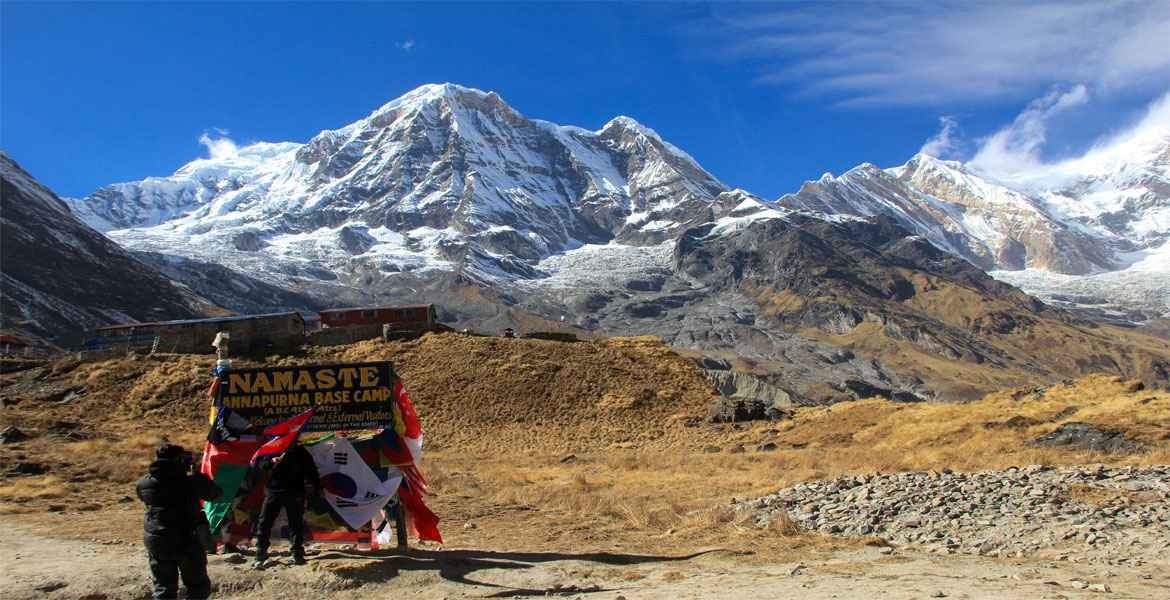
 Way of Namaste in Nepal
Way of Namaste in Nepal